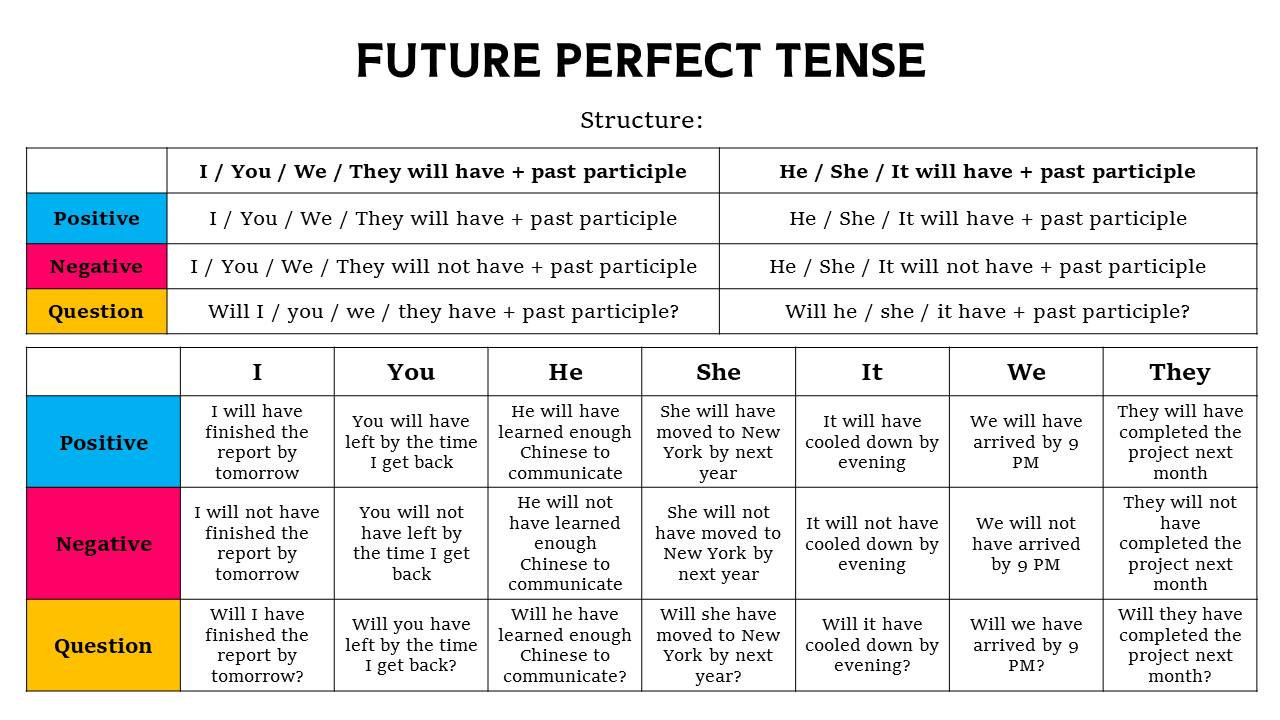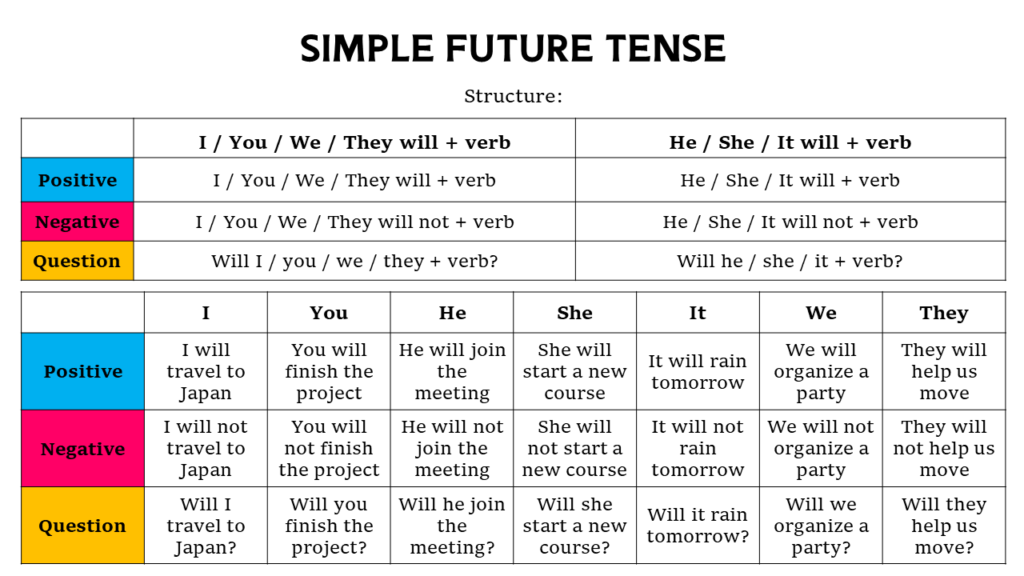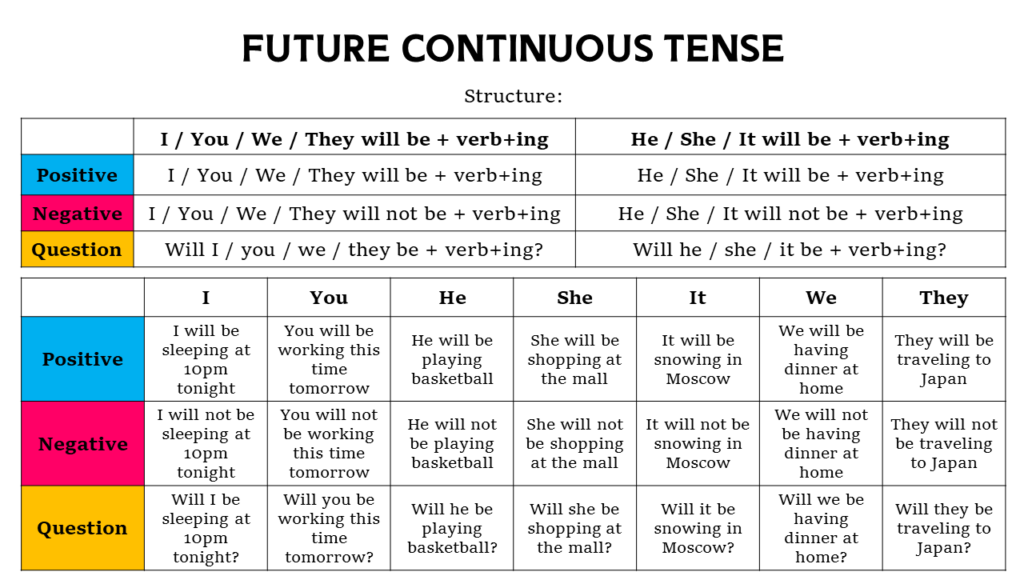As we traverse the vast landscape of English grammar, the future perfect tense stands as a testament to the completion of actions within a specified future time frame. It’s a tense that not only transcends time but also embeds a sense of accomplishment and conclusion in our forward-looking statements.
Definition
The future perfect tense is a fascinating grammatical structure used to discuss actions that will have been completed by a certain future point. It bridges the present with the future, offering a glimpse into the culmination of events yet to unfold.
Formula/Structure
To construct the future perfect tense, we combine “will have” with the past participle of the main verb. This formula serves as a temporal conduit, guiding us through the anticipation of future achievements:
- Affirmative: Subject + will have + past participle
- Example: “I will have graduated by next June.”
- Negative: Subject + will not (won’t) have + past participle
- Example: “They won’t have finished the project by tomorrow.”
- Interrogative: Will + subject + have + past participle?
- Example: “Will you have completed your work by 5 PM?”
Rules with Examples
- Consistent use of ‘will have’: The auxiliary ‘will have’ remains unchanged regardless of the subject. “She will have returned from her trip.”
- Past participle for all verbs: Employ the past participle form of the verb, whether regular or irregular. “We will have reached our destination.”
- Time expressions often accompany the tense: Phrases like “by tomorrow,” “by next year,” or “by the end of the day” are commonly used to specify the future point in time. “You will have learned a lot by the end of this course.”
How to Make Future Perfect Tense
1. Positive Future Perfect Tense
Express the completion of future actions by a specific time using “will have” followed by the past participle.
2. Negative Future Perfect Tense
Indicate that an action will not be completed by a certain future time by adding “not” after “will.”
3. Interrogative Future Perfect Tense
Form questions about the completion of future actions by starting with “will,” followed by the subject and “have.”
Examples of Future Perfect Tense
Examples of Positive Future Perfect Tense
- “They will have left by the time you arrive.”
- “I will have finished the report by 5 PM.”
- “We will have saved enough money by next year.”
- “He will have learned three languages by then.”
- “The flowers will have bloomed by April.”
- “You will have heard the news by tomorrow morning.”
- “She will have made a decision by tonight.”
- “The construction will have been completed by the end of the month.”
- “The athletes will have reached the peak by dawn.”
- “The scientists will have discovered a cure by 2030.”
Examples of Negative Future Perfect Tense
- “The students won’t have finished their exams by noon.”
- “I won’t have read all these books by the end of the week.”
- “We won’t have met our sales target by the quarter-end.”
- “He won’t have returned from his trip by Monday.”
- “They won’t have solved the problem by tomorrow.”
- “She won’t have completed her training by then.”
- “You won’t have changed your mind by tonight, will you?”
- “The movie won’t have started before we get there.”
- “The project won’t have been approved by the deadline.”
- “The sun won’t have risen by the time we start hiking.”
Examples of Interrogative Future Perfect Tense
- “Will you have arrived by 8 PM?”
- “Will they have finished eating by the time we join?”
- “Will she have made up her mind by tomorrow?”
- “Will we have completed the task by the end of the day?”
- “Will he have called by this evening?”
- “Will the team have won the championship by next week?”
- “Will the package have been delivered by Friday?”
- “Will you have decided on a venue by the time we meet?”
- “Will the trees have shed their leaves by October?”
- “Will the book have been published by next year?”

Exercise of Future Perfect Tense With Answers
Questions
- They (to finish) their project by the end of the week.
- She (not to arrive) by the time the party starts.
- (you to complete) your assignment by tomorrow?
- He (to return) from his trip by Monday morning.
- We (not to have) dinner by the time you arrive.
- (it to stop) raining by this evening?
- The team (to win) the championship by the end of the season.
- You (not to have) read the book by next week.
- (she to have) finished her presentation by the meeting?
- Will they (to reach) the summit before sunset?
Answers
- They will have finished their project by the end of the week.
- She won’t have arrived by the time the party starts.
- Will you have completed your assignment by tomorrow?
- He will have returned from his trip by Monday morning.
- We won’t have had dinner by the time you arrive.
- Will it have stopped raining by this evening?
- The team will have won the championship by the end of the season.
- You won’t have read the book by next week.
- Will she have finished her presentation by the meeting?
- Will they have reached the summit before sunset?
This exercise aims to reinforce your understanding of the Future Perfect Tense. Review the answers to gauge your grasp of this tense, and keep practicing to master its usage effectively.


